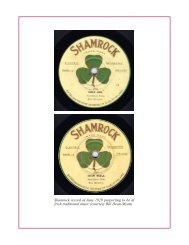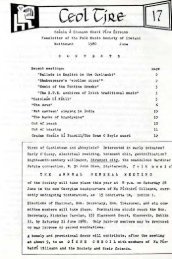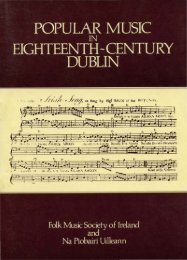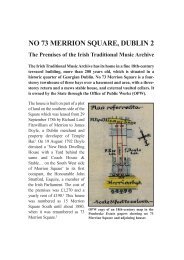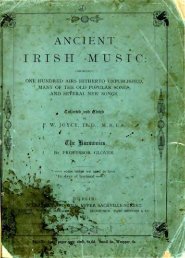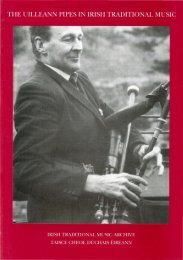Union Pipes - Irish Traditional Music Archive
Union Pipes - Irish Traditional Music Archive
Union Pipes - Irish Traditional Music Archive
You also want an ePaper? Increase the reach of your titles
YUMPU automatically turns print PDFs into web optimized ePapers that Google loves.
COURTNEY’S ‘UNION PIPES’ AND THE TERMINOLOGY OF IRISH BELLOWS-BLOWN BAGPIPES 12<br />
the mouths of <strong>Irish</strong> servants; few of the many <strong>Irish</strong> actors in London<br />
specialised in <strong>Irish</strong> song. As the British music historian Sir John<br />
Hawkins said in about 1785: ‘I know of no <strong>Irish</strong> airs so much<br />
celebrated in England as the Scotch have been’. 24 This situation<br />
began to change in London in the 1780s: the Dublin dramatist John<br />
O’Keefe introduced harp tunes by the famous <strong>Irish</strong> harper-composer<br />
Turlough Carolan (1670–1738) and other <strong>Irish</strong> melodies in his<br />
musical plays there from 1783; 25 Dubliner Joseph Cooper Walker’s<br />
Historical Memoirs of the <strong>Irish</strong> Bards, the first book on <strong>Irish</strong> music,<br />
was published and seriously reviewed in London in 1786, 26 and The<br />
Hibernian Muse, the first British-published collection of <strong>Irish</strong> music,<br />
appeared there in 1790. 27 The performances of Courtney, who was<br />
widely recognised as an <strong>Irish</strong> piper, doubtless helped contribute to<br />
this change of climate. But in reference to the <strong>Irish</strong> bagpipe<br />
specifically, James Dungan, an <strong>Irish</strong> patron of traditional music, said<br />
in the 1780s: ‘I consider my native country half a century behind<br />
Scotland in encouraging and rewarding their best performers on the<br />
bagpipe’. 28 Although Denis Courtney was part of a modernising<br />
trend in contemporary <strong>Irish</strong> life – entrepreneurial, outward-looking,<br />
24<br />
Letter to Joseph Cooper Walker quoted in Walker 1786: 66. Hawkins<br />
excepted only ‘The Black Joke’, correctly regarding this as being an <strong>Irish</strong> tune<br />
of modern composition.<br />
25<br />
Fiske 1986: 459–61.<br />
26<br />
In European Magazine and London Review vol. 19 (1786): 369–72 and<br />
Monthly Review; or, Literary Journal vol. LXXVII (July–Dec. 1787): 425–39,<br />
for instance.<br />
27<br />
‘<strong>Music</strong> lately published, and sold by Messrs. Thompson... The Caledonian<br />
Muse; a Collection of scarce and favourite Scots Tunes... The Hibernian Muse; a<br />
Collection of <strong>Irish</strong> Airs...’, The World, London, 23 Oct. 1790. The volume<br />
carries no publication date and has been assigned to c. 1786 in some library<br />
catalogues.<br />
28<br />
Quoted by Arthur O’Neill in O’Sullivan 1958: II, 163. James Dungan, an <strong>Irish</strong><br />
merchant in Denmark inspired by the Highland Society of London, funded three<br />
competitive harp festivals in Granard, Co Longford, in the 1780s (see Donnelly<br />
1993: 27–9).



